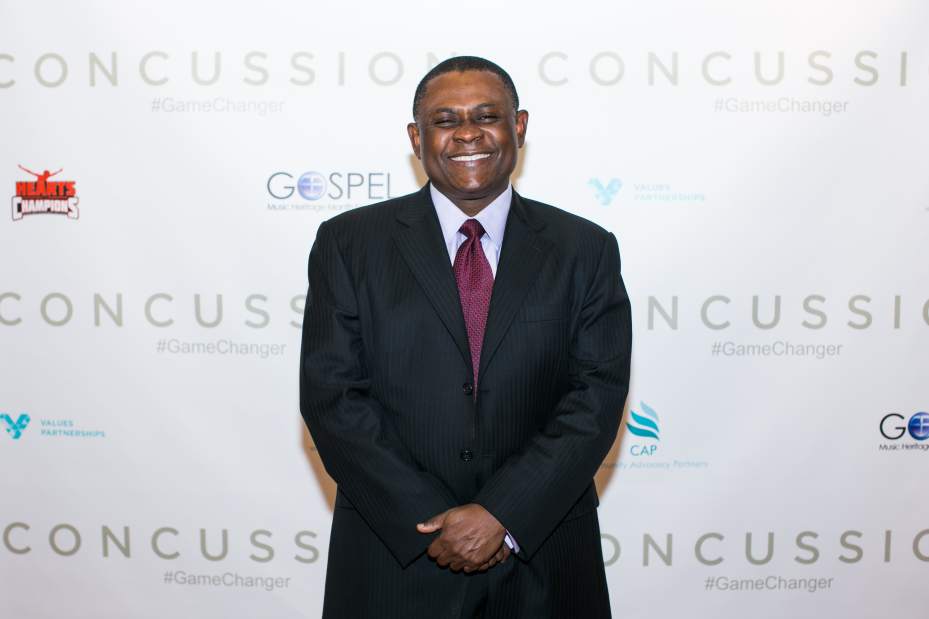https://archive.triblive.com/local/pittsburgh-allegheny/doctor-who-found-football-brain-trauma-link-works-for-cte-cure/
Doctor who found football, brain trauma link, works for CTE cure

Getty Images for Sony
Dr. Bennet Omalu attends a screening of 'Concussion' on Saturday, Dec. 19, 2015, in Houston, Texas. The film depicts the story of Omalu and his findings on chronic traumatic encephalopathy, or CTE.
The forensic neuropathologist who turned football on its head by finding a link between the game and brain trauma vows to help find a cure for the disease he discovered when working in Pittsburgh.
But Dr. Bennet Omalu could come under scrutiny as co-founder of TauMark, a commercial venture that could reap riches in the lucrative industry emerging around preventing, detecting and treating brain injuries.
“When people say ‘for-profit business,' uh, I don't want people to say that as a derogatory (term),” said Omalu, 47, a Nigerian immigrant who is chief medical examiner of San Joaquin County, Calif. “No, it is something good.”
Omalu also is plowing forward with research on chronic traumatic encephalopathy, or CTE, through a foundation bearing his name and affiliated with the University of Pittsburgh.
TauMark owns the exclusive license to a process that it says can detect CTE in living people by using FDDNP, an experimental radioactive compound developed in 1989 by researchers at the University of California at Los Angeles, said Omalu, who in 2002 discovered CTE in Steelers Hall of Famer Mike Webster.
Omalu is portrayed by actor Will Smith in the movie “Concussion,” which Sony Pictures will release on Christmas Day.
Detecting CTE in the living would be a feat, especially if TauMark could fetch the reported $10,000 to $15,000 per test it would charge.
Now the disease can be detected only after death by staining brain tissue and examining for tau protein clusters in areas that control mood, memory and other functions.
The Food and Drug Administration in February ordered TauMark, through the two UCLA researchers who are company officers, to stop making unfounded claims. No evidence exists that brain scans can determine whether former athletes and others have developed CTE from repetitive concussions, the agency wrote.
“FDA has not approved FDDNP for any use,” the letter stated.
TauMark complied and removed the claims in question from its website.
The company is raising as much as $10 million to start a clinical trial needed for FDA approval. Omalu did not say when that trial might begin.
“It's a business,” he said. “I cannot reveal the corporate plans.”
Having researchers involved in a commercial venture is common, said Josephine Johnston, research director at the Hastings Center, an independent bioethics research institute in Garrison, N.Y.
In addition to his role at TauMark and serving as chief medical examiner in Lodi, Calif., Omalu is an associate clinical professor at the University of California at Davis.
The Bennet Omalu Foundation, publicly announced last week, has a partnership with Pitt.
“These types of relationships certainly are not unusual in medicine and academic research,” Johnston said. “It's a huge topic of debate.”
Financial ties can lead to bias, validity of research and conflicts of interest, she said.
“These are companies that have an interest in the outcome. They want research to come out a certain way,” Johnston said. “(Omalu) is a partner in a company that stands to make a lot of money if the research goes forward. That's a fact.
“But what do you do about it?”
The National Institutes of Health, the world's largest financier of medical research, soon will announce a recipient to conduct a seven-year, longitudinal study for diagnosing CTE in former college and professional football players, said Dr. Patrick Bellgowan, program director for NIH's Traumatic Brain Injury Research.
TauMark is one of several applicants, he said.
“We're hoping to develop diagnostic criteria in the living, and then start to see if there are predictors of that,” Bellgowan said. “There's not a lot we know about CTE.”
Omalu in 2002 conducted an autopsy on Webster at the Allegheny County Coroner's Office. Webster, 50, died of a heart attack, but Omalu was interested in finding out what contributed to years of bizarre behavior he had exhibited.
When examining Webster's seemingly normal-looking brain, Omalu found microscopic clusters of tau protein frequently seen in people with Alzheimer's disease. This became the first documented case of CTE in a former National Football League player.
Omalu published his findings in 2005, and in 2006 regarding CTE in the brain of former Steeler Terry Long.
Wheeling attorney Bob Fitzsimmons, who represented Webster, Omalu and Dr. Julian Bailes, a former Steelers team doctor, in 2002 established the Brain Injury Research Institute, a CTE research group.
All three are listed as founding members of TauMark, which formed in March 2013 as CTEM LLC, according to corporation records filed in West Virginia.
Bailes later dropped financial interest in the company.
Other TauMark officers include NFL sports agent James “Bus” Cook and UCLA researchers Dr. Jorge Barrio and Dr. Gary Small. The company paid UCLA to license FDDNP, a chemical marker developed in 1989.
“To buy the intellectual property license, we need a corporation,” Omalu said.
Neither he nor UCLA officials revealed how much was paid.
Jason Cato is a staff writer for Trib Total Media. Reach him at 412-320-7936 or jcato@tribweb.com.
Copyright ©2026— Trib Total Media, LLC (TribLIVE.com)
